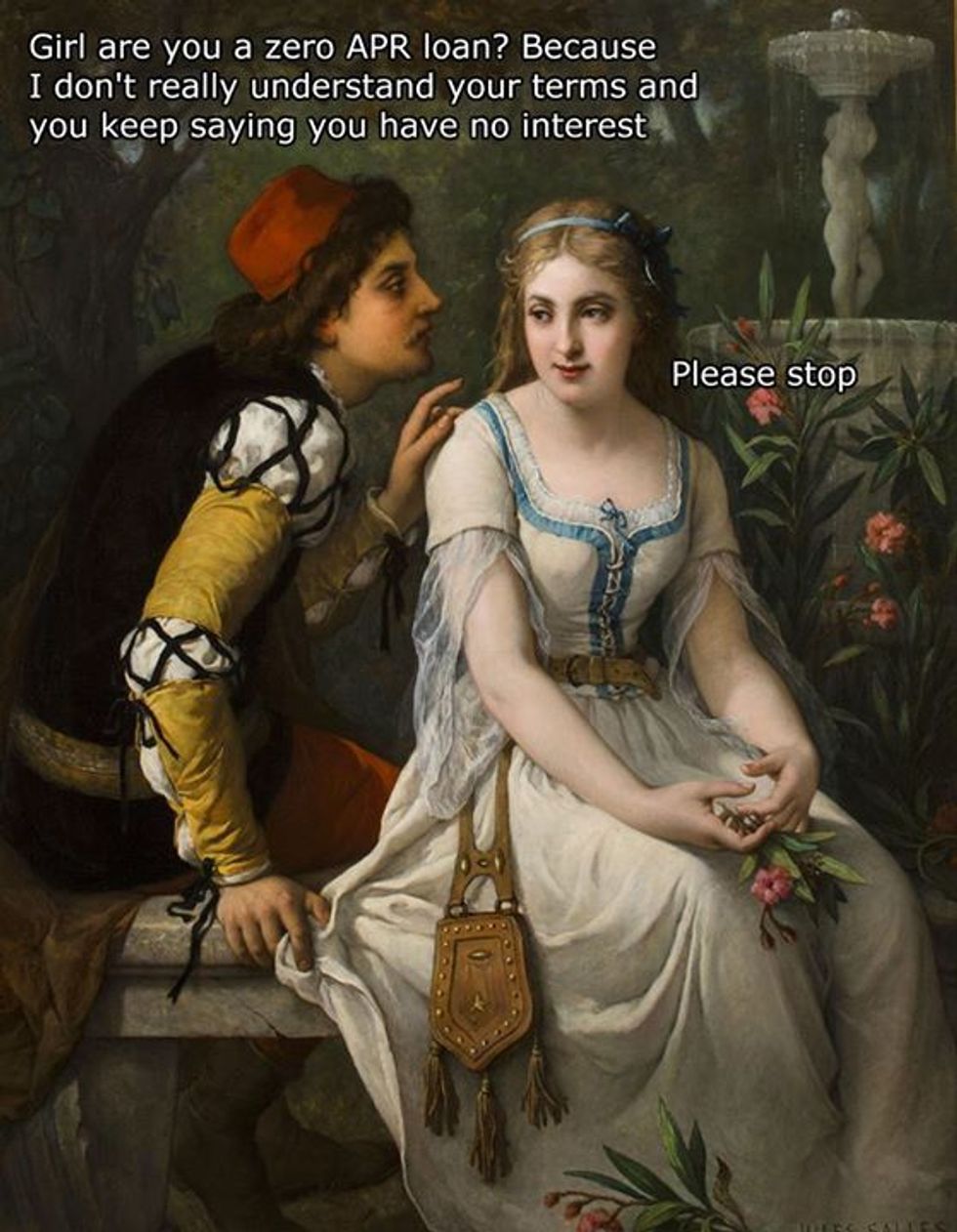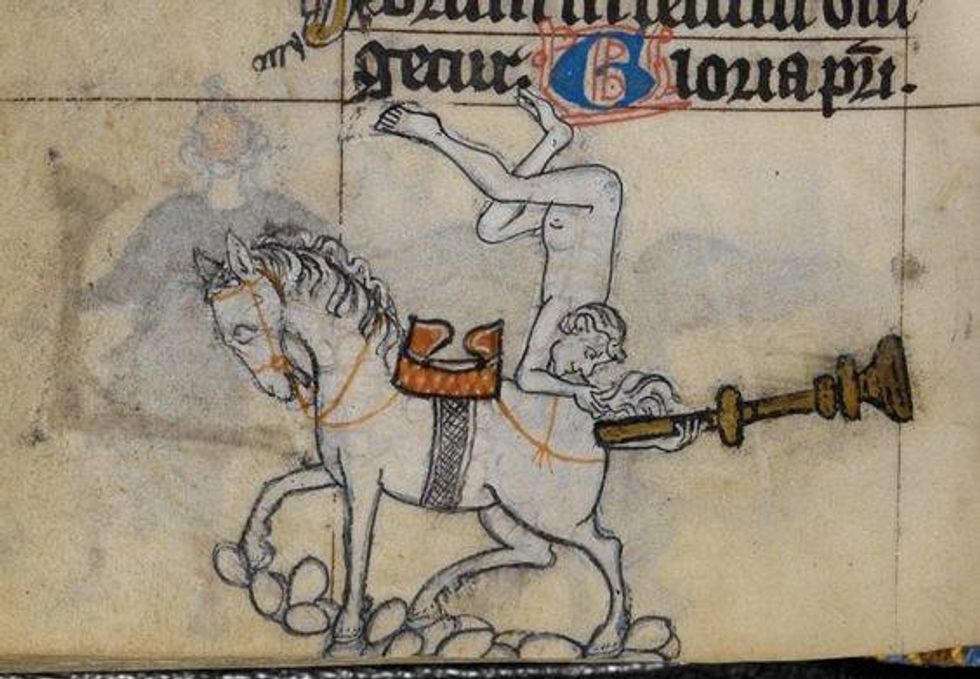Whether you drop your steaming hot coffee on your lap in the middle of the morning rush hour, stub your toe on your night stand, are describing the problems of your digestive track after eating that chili-dog from a questionable food truck (yeah...why did you do think that that would be a good idea again?), or are watching a hit series on Netflix where there is a mind-boggling love trial of secrets and infidelity that make you just want to SCREAM...you've probably muttered a "slang" word under your breath or in your head from time to time (or, you know, maybe screamed it in your car while beeping your horn.)
Cursing and slang is a very real and evident part of our culture, whether part of the 18+ section of our population, or, a funny daily expression for all ages, slang is here with us in the twenty first century, and we use it subconsciously every day.
Strange to think...but it was real in the Renaissance Era as well! That's right, all those men in the funny clothes, and all those ladies in the overly-adorned dresses said slang words every day as well. Exploring Renaissance slang is a slightly humorous, but extremely insightful way to get a bird's eye overview into bits and pieces of what life and social interactions were for the people who lived in Renaissance society!
Enjoy a researched, analyzed and creatively explored "Urban Dictionary-esque" version of Renaissance slang that is broken up into several convenient categories. Whether you're a shrew, or an ale-soused apple john, hopefully you can pull up a chair, gain a few laughs, and learn a bit of insight in a very important and influential culture from long, long ago!
Potty Humor
Scatological humor is the kind of humor that deals with defamation, urination, flatulence, vomiting and other bodily functions: potty humor. This type of humor is preoccupied by “disgust.” In modern 2017 society, most people scoff at this type of humor and dismiss scatological humor and slang as grotesque. It is worth noting that in the Early Modern period however, potty humor was absolutely considered funny and even witty (Sider).
The language of disgust was not reserved for any particular class in the Renaissance: “Toilet humor, even scatological jokes, evidently was enjoyed by all classes of readers” (Sider). Scatological humor and slang was an important component to Early Modern works of literature, and these jokes overflow from Shakespeare’s plays. Scatological humor was debatably even a rhetorical technique for Renaissance writers: “Early modern English writers used disgust to explore sexual mores, describe encounters with foreign cultures, and manipulate their readers’ responses” (Eschenbaum and Correll). The language of disgust was considered friendly, funny, and literary. When potty humor was used in the Renaissance, it was more likely used with comedic or good-natured intent, as opposed to insult.
What might account for this obsession with excrement in the Early Modern period? Some scholars consider social and psychological pressures. Many Renaissance conduct books explicitly advised against disgusting behavior (Eschenbaum and Correll). These popular handbooks essentially made disgust a second nature. The fixation on disgust is arguably characterizes as a backlash “to upset the boundaries that had previously defined acceptable and unacceptable behaviors, people, and literatures” (Eschenbaum and Correll).
1. A Pox On You - I hope you contract a horrible incurable disease and die. Romeo and Juliet
2. Churle - person of low birth or a peasant. Romeo and Juliet
3. Yard - a man's private area.
4. Jakes - a latrine; a toilet. A New Discourse of a Stale Subject, Called the Metamorphisis of Ajax 1596
5. Ajax - a water closet; a lavatory. Love’s Labour’s Lost
6. Privy - A room or small building set aside for people to urinate and defecate in; (in later use) esp. one situated outside a dwelling. Hamlet
7. Gong - a latrine Joannes de Mediolano. Regimen sanitatis Salerni
8. Gong Farmer - in compounds denoting a person employed to empty or clean out privies. A New Discourse of a Stale Subject, Called the Metamorphisis of Ajax 1596
Potty (quite literally) Humor Skit
To view the full skit, click here:
https://www.youtube.com/watch?v=6hlIErlVQqk&feature=share
Person 1: “My love, this is quite the show, I do say. I admit your choice was quite impressive.”
Wife: “Oh darling, what flattery. I see archers in the distance, might you go show them your skills?”
Person 1: “Ay, but first, I am in desperate need of a pot, I am still quite unsettled from the foolish merchant’s disgusting ale.”
*wandering around*
Person 1: “Excuse me, where is the gong around here? You see, I’ve been looking for it for --”
Person2: “Oh, I’d love to know too. I’ve needed the jakes for quite some time. Assistance in the matter is becoming necessity.”
*wandering together*
Person 1: “Excuse me, sir, you must be the gong farmer, granted this is not the first faire I’ve ran into you at!”
Person 3:” Being a churl doesn’t make me a gong farmer, you fob. All of you nobles believe it is okay to treat us as you please because you were born into money! I have been working proudly for my keep.”
Person 1: *Sarcastically* “I beg a thousand pardons, sir. It is not apparent that you possess the fragility of a lady.
Person 2: “We only needed the privy; no need for outburst gentlemen.”
Person 3: “The ajax is that way! If you can’t find your yard either, then you can sard off!”
Person 1: “How dare you speak to me that way! A pox on you, worthless scum!”
Gender Euphemisms
In the Renaissance, gender, and the roles of gender were extremely outlined and held up firmly within the functionings of society, especially in the social realm.Gender Euphemisms/gender related insults played a very active, present part in art, literature and dialog during social gatherings, all subliminally reinforcing the ever so meticulously defined dynamics of gender in Renaissance society and the roles in which gender existed within. The Renaissance was a time where classical philosophy and art became heavily influential again, and was reopened to be examined and made new. This included ancient philosophies about the difference of the sexes and what they meant. The scholarly book, A Feminist Approach to the Body in Medieval Literature, written by Linda Lomperis and Sarah Standbury summed up the concept very efficiently when they examined one of Aristotle’s quotes, and how it influenced medieval literature, science, and society when they said, “Aristotle’s views of women and his definition of gender sprang from his consideration of the nature of reproduction [in which] ‘the male stands for the effective and active, and the female, considered as female, stands for the passive, it follows that what the female would contribute to the semen would not be semen but the material for the semen to work upon.’ Furthermore, a woman is defined by her incompleteness. A female child is simply seen as an incomplete male.”
This idea is seen within the social structure of the Renaissance because the role of women in this particular time and history is to be exactly that: a mild, delicate, more tender and slow-to-speak version of a man, that acts as something lovely, behaves like a lady, and upkeeps a home well. Because of this, men were boisterous, fierce beings that proved their masculinity through sports and knowledge and ability to direct and lead, and women proved their femininity through ladylike loveliness, womanly gossip, and child-rearing. Gender Euphemisms alluded to the roles each gender had, and, in a couth manner, exhibited individuals who did not conform to their designated gender role. For example, let’s take the word “shrew,” the word “shrew” simply means a loud, boisterous, outspoken woman who does not act like a lady and therefore does not know her societal place. We can find literary evidence of this word in Shakespeare’s The Taming of the Shrew, a play written about a boisterous woman, and a man who agrees to tame her in order to wed into her fortune. We will furtherly explore the concept of gender euphemisms in a skit that is taking place between a young girl who is being prepped for marriage by her mother.
1. Tallowcatch - Shakespeare's inventions directed at the gross, womanizing knight Falstaff in Henry IV, Part 1.
2. Nothings - Elizabethan euphemism for lady parts. Much Ado about Nothing.
3. Fop/Fopdoodle/Fopper - A fop, fool, or simpleton. The Merchant of Venice
4. Ale-Soused Apple John - A drunk, wrinkly, dumb man. Henry IV
5. Crooked nosed knave - An unclassy, poor, lowclass, uneducated a**hole. The Anatomy of Melancholy
6.Cox-comb - An arrogent, vain jerk.The Coxcomb, 1647
7. Strumpet - Female prostitute. Othello
8. Codpiece - Scrotum. King Lear
9. Lout - An awkward, ill mannered fellow; a bumpkin; a clown. Two Gentlemen of Verona
10. Shrew -Negative word for a woman who is outspoken.Taming of the Shrew
Gender Euphemisms Skit
To view the full skit, click here:
https://www.youtube.com/watch?v=fXDqjVN4MBI&feature=youtu.be
Daughter (lamenting): But mother, what is the point of this elaborate ornamente)ation of my dress? My broach, my gable headdress*, my stomacher*, my gorget*, my shoe rose*…. All of this beauty, useless if not touched by a gentleman’s hand. Mother can you not see, I am the worst, lowliest wench of all and I will grow up to be an old maid. I am like a free lark without a cage, and bloody codswallop, my womanhood needs a cage!
Mother: Well what about that lovely Marvell gentleman, he has quite the gift for letters. He could write you some fine poetry!
Daughter: All poets are fopdoodles! Oh mother that I could marry such a crooked-nosed knave such as Marvell-- I would surely starve in squalor for the rest of my days! Find me a prince, nay, my perfect Romeo.
Mother: But foolish child! Our perfect Romeo was the product of Shakespeare the poet! My fair Beatrice, do not be such a shrew! There has been talk amongst the ladies in the court. They have quarrels with your uncouth manner; You have been known to wear the breeches. Now I am sure you know very well from our daily reading sessions what Castiglione would say about a girl like you in The Book of the Courtier.
Daughter: Oh a pox on that bloody handbook of courtship and gendered behavior! Mother, I am no shrew. I am but a simple angel whose wings--bedecked with heavenly pearls, whose crown--adorned with sapphire, rubies, and emerald. Mother, you ask me, an angel, to envision my betrothal to that ale-soused apple (Thor), and next, that smelly lout (Gregorio) who is such a clown, or perhaps that arrogant cox-comb Lord (Percival). Truthfully mother, you can be a bit of a strumpet yourself.
Mother: *Strumpet or not, I advise you well. Lower thy standards child, or this bloody town shall be completely barren of men. “If thou wilt needs marry, marry a fool; for wise men know well enough what monsters you make of them.”
Daughter: I will not marry a bloody tallowcatch if he is the last man on earth! You may as well hand me some cloth to mend, or teach me to embroider garments, or show me some way to spend idle-time, for I am fated to be an old maid! Such a fate is better than having this conversation.
Mother (sighs): Perhaps you are simply too young for courtship. Your vile wit and quick tongue leaves me with no choice. We shall wait until next year, when you are 15 years of age. Perhaps time will instill some sense into you, child.Sexual Euphemisms
The term euphemism refers to polite, indirect expressions which replace words and phrases considered harsh and impolite or which suggest something unpleasant. Euphemism is an idiomatic expression which loses its literal meanings and refers to something else in order to hide its unpleasantness. Euphemism depends closely on the social context of the speakers or writers where they feel the need to replace certain words that may prove embarrassing for particular listeners or readers in a particular situation.
Sexual euphemisms during the Renaissance era was just as common as daily expressions. Many of the implications of the words and phrases are used in everyday insults, whether playful or in frustration. Some of the words’ meanings are not too hard to figure out simply because of context clues. For example, “bedswerver” quite literally means what it says- someone swerving from bed to bed considered to be an adulterer. So the same meaning is there, it just sounds less trashy than calling someone an adulterer.
Below the list of slang words, we have a skit with a father and his son playing chess with one another. Their scene begins with playful trash-talking but, after some gameplay and commentary, the trash-talking evolves into a series of innuendos and, what we might call, “locker room talk.” It is a friendly but explicit exchange of name-calling and insults directed back and forth between the sexuality of the father and the sexuality of the son.
1. Bedswerver - A term invented by Shakespeare that became popular in Victorian slang, this word refers to an adulterer/adulteress. Winter's Tale
2. Doxy - A promiscuous woman. When Daffodils Begin to Peer
3. Puterelle - A classless woman, tasteless women; skanky etc.
4. Mandrake Mymmergin - Underdeveloped, childlike man.
5. Fleshmonger - A fornicator; a pander. Hamlet
6. Nun of Venus - Euphemism for a whore (towards women).
7. Wench - To associate with common women.
8. Swive/Swyve - To have sexual connection with; to copulate with (a female). 2nd Part Nights Search 1646.
9. Daggle-tail - A person (esp. a woman) whose garments are bemired by being trailed over wet ground; an untidy woman, slut, slattern. (KF) Raphael Holinshed · The first (last) volume of the Chronicles of England, Scotland, and Ireland 1577
10. Codpiece (noun): A bagged appendage to the front of the close-fitting hose or breeches worn by men from the 15th to the 17th c.: often conspicuous and ornamented (often used in place of/ as slang for “penis”). Two Gentlemen of Verona
11. Nun of Venus=euphemism for a whore (towards women).To view the full skit, click here:
https://www.youtube.com/watch?v=dj3prbdK7vI&feature=youtu.be
MEN SIT AT A TABLE ACROSS FROM ONE ANOTHER PLAYING CHESS:
Father: Thor, my son, oh but if it were that your courtship skills surpassed your chess prowess.
Son: Oh father, you levereter, how you jest with that boisterous spirit of yours. I am an oaf at chess!
Father: Truly, you are, for I am about to checkmate! Oh son, what a courtier you are, however misguided. You know I fear you are becoming a full-gorged flesh-monger. You spend your days scouring the streets in search of Winchester geese, wenching among scullions and rats...Son, be not a fishmonger. This way of life ails the spirit, and what all you shall find there but an untidy, slattern, daggle-tail of a bride?
Son: It is your turn now father, move.
Father: Very well son, admittingly you are making this quite difficult. Now, (humor me this):I do hear of a young maiden by the name of Beatrice. She was out in society at the ball of Lord Percival, as radiant as the nightingale’s sweet breath, and as spritely as a blade of grass in the sunlight. Such purity in appearance could not possibly befit a puterelle.
Son: But father, did her speech you hear? And the doxy’s swift tongue? *The lady doth protest too much, methinks. Would you urge me wed an enemy of her kind like that? For I would rather bed a monster.
Father: Thor, you must be mistaken. Mine own eyes have seen Beatrice, and I cannot be convinced. But I also know Beatrice’s mother--in more than one meaning of the word. See, I knew her.
Son: Father you bed-swerver! You (flesh-monger)! My very own (beloved father) carousing with married women, violating their kettle drums and nothings and swiving with the devil...
Father: T’was a time of folly in my full-gorged youth. T’was many, many a fortnight. Watch your pawn son, it is your turn. I am winning this chess game you mandrake mymmerkin.
Son: Father, in regards to Beatrice and mum, do you suppose the apple falls far from the tree? Could she be the lady for me?
(Father and Son laugh maybe)
Father: A soothsayer did come to me once in a dream, and did say, Beatrice and her mother are no nuns of Venus, no nuns of Venus, nay.
Son: Oh blessed be, Father. My codpiece cannot wait any longer.
Father: Ay, now that is the son I raised. Now hurry and let us finish this game. If you win, I will take you bear-baiting, and we can relish in our manhood together.
Son: Game-on father, game-on. for I do love bear-baiting: Oh how the bear does roar when the pack of dogs rip its throat out, and oh how the flesh does tear and fly from sharp paws, in droves of animalistic violence, in woe of masterful death. There is nothing quite like sport for the true gentleman of London.
Blasphemy & Every Day Expressions
Blasphemy was a major component of Renaissance literature and daily speech. Ironically, insults spoken against God were considered a serious matter in the later years of the Renaissance, as it was considered to be “the worst manifestation of heresy… offending and endangering those who spoke it and also anyone who happened to overhear it (Horodowich). Nevertheless, blasphemy was still commonly used in Renaissance language and texts. Many established writers and poets of the era including John Donne and Barnabe Barnes were infamous for including blasphemous imagery within their texts, in fact, a striking feature of much English poetry of the 1950’s is the use of sacred imagery in erotic poetry and erotic imagery in sacred poetry, where the sacred imagery in erotic poetry was often specifically drawn from Catholic practices and doctrines (Hackett). Despite its constant use, blasphemous language was frowned upon because the state perceived a direct correlation between the behavior or misbehavior of its inhabitants and the city’s fortunes” (Horodowich). While holy speech was thought to bring about military and political success, blasphemous language and other unholy behaviors were thought to bring about defeat and loss. Blasphemous language was also thought to be a thing of the “disruptive lower-class,” as speech was often said to represent one’s social status in society. Commonly used slang phrases like “a pox on you” which was used as a curse, is an example of this commonly used blasphemous language of the Renaissance. Phrases like “God’s blood” or “God’s tooth” were also commonly used as swear words in daily speech. Therefore, while the use of blasphemy in Renaissance literature and language was nearly forbidden by many governments, the phrases were still commonly used and heard throughout the Renaissance era.
In her article “The unmannered tongue: Blasphemy, insults, and gossip in Renaissance Venice, Elizabeth Anne Horodowich suggest that ideas about speech and taking were central to Renaissance conceptions of civil society” and that it is impossible to think of early modern society and politics without thinking of rhetoric and language. Slang and cursing have always been a part of daily speech, and this is especially true of the Renaissance, however, one’s daily speech was typically thought to say plenty about one’s role in society. It was common to believe that “the way that one spoke revealed one’s social position” (Horodowich). Therefore, while terms and phrases such as “breeches” meaning money or “by my troth,” commonly used to express strong assertion, were slang terms that would have been used by nobler, upper-class women and men, more derogatory terms like “fat-kidneyed” meaning stupid, or “ronyon,” an unattractive older woman, would’ve been heard used by lower-class Renaissance society. The daily expressions of the era also reveal Renaissance ideas about gender and gendered behavior. For example, gossip was viewed not only as a terrible thing that “affected family honor and respectability” but also as “untrustworthy, feminine speech that needed to be silenced to prevent the exaggeration of false rumors from disrupting public life” (Horodowich). Although, despite these Renaissance era views of gossip, it is studied that Renaissance men gossiped just as much, or even more as women. Therefore, derogatory terms and phrases that would commonly have been used to gossip amongst the privacy of close friends, would’ve been used often by both women and men, but only of a lower class. Gossip, and therefore slang, was a key oral network by which information circulated amongst Renaissance society, ultimately meaning that while daily slang expressions may reveal social class and gender differences, different forms of the slang language were constantly being used by the people of the Renaissance.
1. A Pox Upon/A Pox Be Upon - Meaning, a curse be upon you (a pox be upon your home etc). The Tempest
2. God's Blood, God's Teeth - This was a very blasphemous statement taking God's name in vain. Similar to the current expression "What in God's name..." Othello
3. Fie! (pronounced "Fy!") - equivalent to "Darn it!" Hamlet
4. Breeches - AKA money, a term of ridicule applied to the Commonwealth coinage, suggested by the arrangement of two shields on the reverse side of the coin. Speech in Ho. Peers 3
5. Canker - Used figuratively. A malignant or destructive influence that corrodes or corrupts, and is difficult to eradicate. The Fairie Queen
6. Levereter - Someone who drains society of goodness, lies, is willing to peddle anything in order to “get ahead” (usually used in reference to corrupt aristocrats, politicians, business men). Levereter; 1432
7. By my troth - expressing strong affirmation or assertion. Much Ado About Nothing
8. Ronyon - a scabby, old woman (an unattractive, ugly lady). Merry Wives of Windsor
9. Scullion - A domestic servant of the lowest rank in a household who performed the menial offices of the kitchen; hence, a person of the lowest order. Henry IV
10. Fat-kidneyed - stupid.
Sexual Euphemism Skit
To view the full skit, click here:
https://www.youtube.com/watch?v=CfnuEA6yuhY&feature=share
Student1: *gets test back (failed)* “Another F? Fie! I truly may have been more successful as the apprentice of a blacksmith; or worse, my father.”
Student 2: “I bet the fat-kidneyed lonely just has it out for you. He looks more like a runyon than most hags. Probably just bitter. I say, offer him some breeches after class! By my troth, I bet that’ll fix anything.”
Student 1: “My friend, you are quite the canker *laughs*. He’s no better than a levereter or a scullion.”
Student 2: “I bet if your sister could get in here she’d curse him for you. Wouldnt that be silly, a girl taking classes” *laughs*
*bell rings, walking out*
Student 1: “God’s blood, I studied all night. (*turns to teacher*) I demand a retrial. What quarrel have you to call me fool. I may be young but this will not stand.”
Teacher: “Are you insulting my competency as your educator? How dare you!? You are but the son of a simple barber. You have no place here, filth. When I was young, the students would have thrown you out themselves.”
Student 2: “How dare you! This is the son of the barber of the noble that owns your very residency, my father. And he will be hearing about such incompetency.”
Teacher: “I… a thousand pardons. *turns away whispering* Ugh, a pox on me…”
*walking away*
Student 2 to Student 1: “My father says that man only made it through because his father was the noble of his teacher’s home. God’s luck is on our side this time!”
So there you have it, you louts and wenches! We hope you enjoyed this brief insight into the renaissance!
Article created by: Phebe Ciemny, Katie Franklin, Austin Savage, and Casey Denney



























